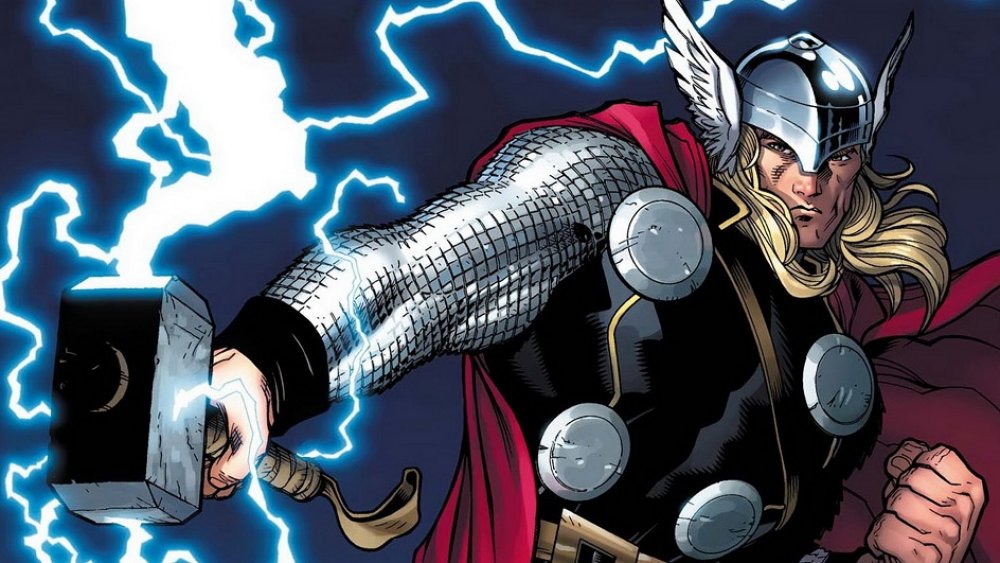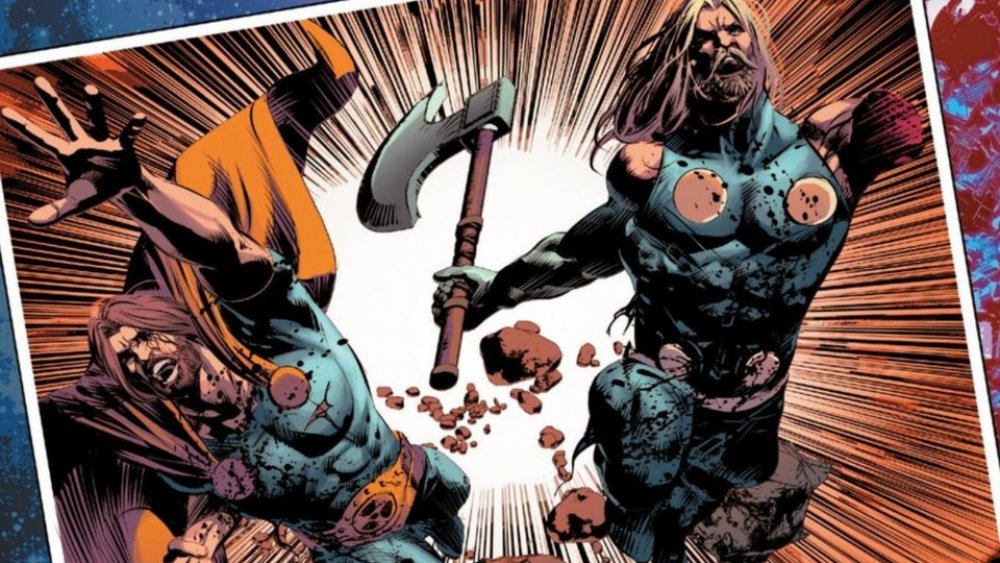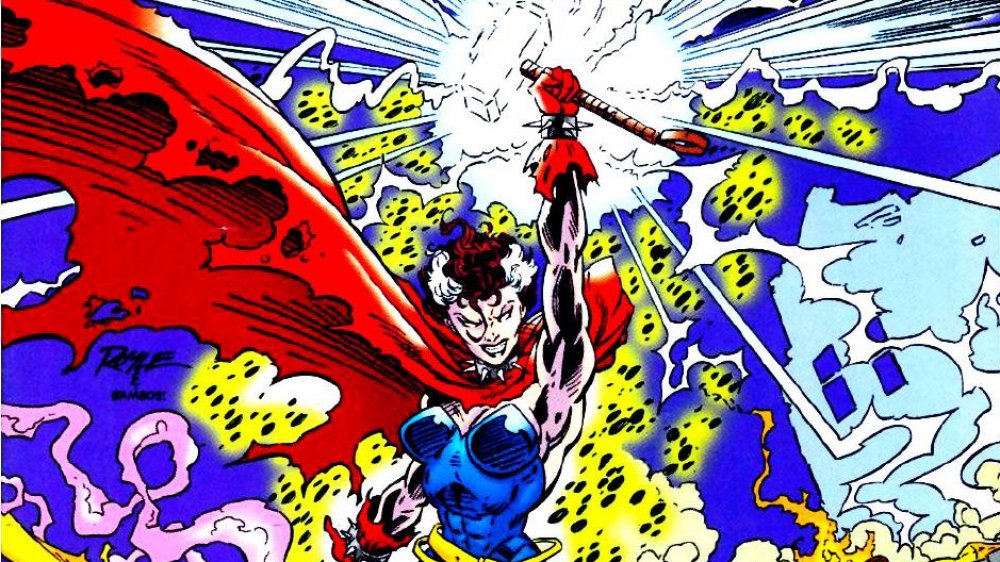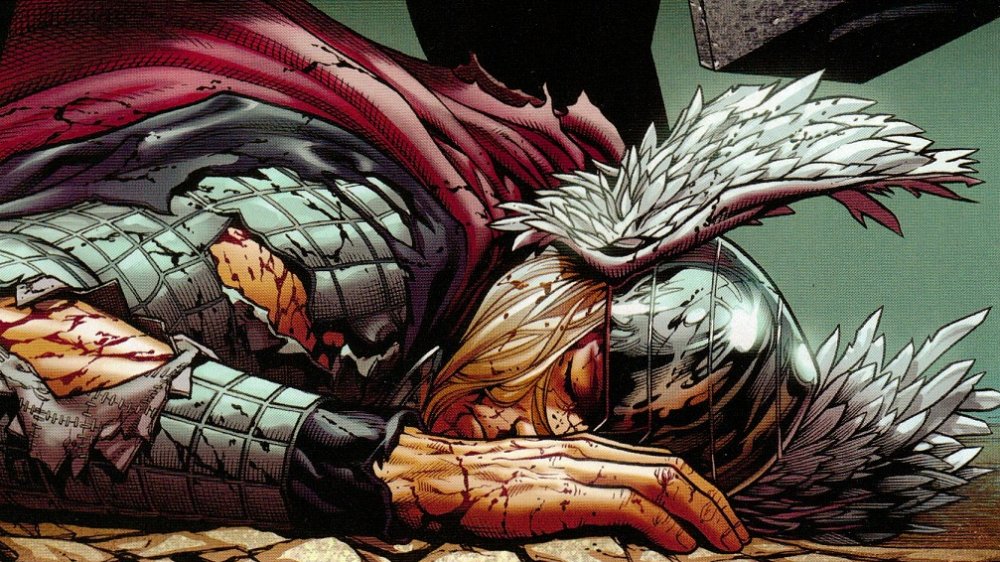This Is Who Can Kill Thor
Thor is regarded as one of the mightiest Avengers and a ranking personality on the list of most powerful beings in the overall Marvel multiverse. His place on such a celebrated pedestal means he's often looked to as the Big Gun for many battles to fight and trials to crack out when lesser, mortal heroes reach their limit. He's a god, and many would be led to believe that means he's omnipotent, but he isn't. Thor can fail, get hurt, and even stare down the gullet of death.
The instances in which Thor can be ended permanently (or as "permanently" as comics canon will permit) are rare, heavy moments, but they do exist. After all, the more powerful you are, the more profound it is when mortality overtakes you. Real death has come to Thor a few times, though some of them are technical loopholes based on de-powering the God of Thunder, or dimension-traveling trickery. Let's go over the canonical examples of those who have faced down Thor on his best day and cast him to his doom.
The Beyonders have killed Thor
During the New Avengers run, the multiverse is in terrible peril at the hands of the Beyonders, a near-omnipotent extra-dimensional race of aliens attempting to implode all the existing universes simultaneously using a singularity they created in one person, the Molecule Man. When he's killed, the singularity connecting all iterations of the Molecule Man would detonate, destroying the multiverse with them. Quite a tall order of existential threat, indeed.
In issue 32 of New Avengers, Thor takes point on a small contingent of other superheroes, aiming to take the fight right to the Beyonders in space as a last-ditch defense. They all understand that this is an impossible effort, that they're cornered, and that all they can do is to hope they can kill one or two Beyonders and accept certain death doing it. Thor and Hyperion, a fellow hero and member of the Eternals, have a touching exchange about brotherhood in the face of death that ends with Thor cheerfully saying he will race Hyperion to Valhalla. Even before certain doom, Thor remains charmingly Thor.
Rogue sent Thor to his grave
Though this story was published in the What If? series in 1994 and thus is somewhat extra-canonical, issue 66 has Thor and other Avengers confront Rogue as she attempts to bust members of the Freedom Force, a coalition of X-Men mutants, from prison. She overwhelms Thor in battle and absorbs all his powers, leaving him barely alive. The surviving Avengers who escape Rogue's terrifying new power combo take Thor to the Fantastic Four in hopes of saving him, but alas, the God of Thunder is already gone.
Later on in the astral plane, dead-Thor convinces Rogue to break her ties with Loki (he came to her with a deal to take over Earth, because this is comics) and take up his mantle properly and honorably. Since she has absorbed Thor's powers and can utilize them, Rogue is able and worthy to wield Mjolnir — and is Thor, conceptually. She accepts her new responsibility, destroys Loki's ambitions, and goes on to serve as Goddess of Thunder with Odin's fatherly stamp of approval and everything.
It's a rather silly and ignoble death for Thor, but stealing life force and powers is a long-established part of Rogue's mutant skill set, and therefore is well within the elastic boundaries of relative superheroic strengths and weaknesses for her to be able to accomplish.
Thor, Ragnarok, and who kills whom
You didn't see any big snakes in director Taika Waititi's Thor: Ragnarok, but the original conceptualization of the Asgardian apocalypse (drawn directly from Norse mythology) comes with Thor fighting a massive kaiju-snake named Jormungand, otherwise known as the World Serpent. With both Thor and Jormungand being mythological constructs, it's naturally the demand of fate that Thor fight the Serpent, defeat it, and die in order to complete Ragnarok. There are a few iterations of Thor performing self-sacrifice to this trope, and it becomes a bit of a chicken-or-the-egg argument as to who's actually responsible for Thor dying. Is Jormungand the killer for being the initiating circumstance, or Thor himself for choosing it, though he must choose it as his hero status and legend demands?
In 1987, the final stories by the iconic writer-artist Walt Simonson have Thor face off with the World Serpent in mortal combat; every page of the issue is a single-panel splash to add to the mythic hype of the event. At the end, despite being weakened by a curse cast on him by Hela, Thor triumphs over Jormungand and appears to vanish — leaving only his empty armor, just as the legend demanded of him.
The Fear Itself series from 2011 also features the God of Fear manifesting as the World Serpent after centuries of dormancy. Jormungand make its way to Oklahoma, where the Asgardians have come to live as refugees and have replanted Yggdrasil, the World Tree. To prevent Jormungand from consuming the Tree, Thor asks Tony Stark to assemble special weapons with the assistance of the Dark Elves so the Avengers can help him fight the Serpent and his minions. Thor takes on the god one-on-one, wins, and once again dies as a result. Odin, who was prepared to raze the entire Earth to avoid this version of Ragnarok, is devastated by his son's death.



